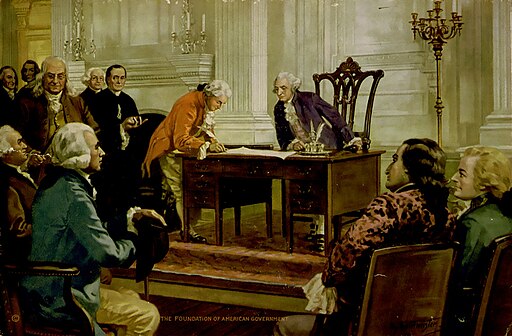Liberty Matters
Response

Dr. Ross: A Corrupt Bargain….The Detail Committee
My thanks to Dr. Ross for his lively review of the proceedings of the Detail Committee, which presents us with a vivid reminder of just how large a role faction, self-interest, venality, and sheer contingency played in the constitutional convention.
That we should accept Garrison’s interpretation and verdict on the episode—that it represents a corrupt bargain and enduring dishonor to the nation—is less certain.
Garrison, it seems to me, characteristically refuses to come to terms with three considerations which complicate the moral calculus considerably. 1) No one in the constitutional convention, on any side of the issue, believed that any federal government they might bring into being would have the power to abolish slavery in the states where it already existed. If there was to be a union at all (for reasons spelled out by Hamilton in the Federalist), it must include all the states, including the slaveholding states. 2) Any effort to go further in anti-slavery measures than the Constitution did would have rendered the ratification of the Constitution (and union) impossible. And 3) such measures as the convention did approve were envisioned by advocates and opponents alike as putting slavery on a course toward eventual extinction.
The moral question regarding honor or dishonor then strikes me as something like this: was there any real world course open to the framers that offered a greater likelihood of restraining and eventually eliminating slavery? Garrison’s consistent, life-long hatred of slavery may evoke our admiration. But the consequence of Garrison’s reasoning—as he and his critics knew—was a rejection of the United States in toto, a demand that morally conscientious individuals simply withdraw, secede on an individual basis from complicity in a corrupt union. Such purity may be flattering to moral vanity, but it is hardly a course calculated to bring any actual improvement in justice. And indeed, it can leave others to bear the costs of one’s purity.
It was this not least which was responsible for Frederick Douglass’ own white-hot exasperation with Garrison. Garrison would have purchased his purity at the cost of leaving the slave-holding states to their own devices. Is this, Douglass asked, what “fidelity” to those actually in slavery required?
Douglass is right, it seems to me, on another point: that the truth of the principles enshrined in the document is a separate question from the speeches and intentions of some of those present at the convention. Admittedly, the episode shows us that participants in the debate were fallible, often selfish, and short-sighted. If, however, the final document represented the best real world likelihood of seeing the principles in the Declaration realized in practice, and the ultimate elimination of slavery, then the question becomes, at the very least, more complicated.
Dr. Rasmussen: Gouverneur Morris: Abolitionist at the Convention
In the midst of the contemporary tendency to dismiss the founding in total as racist, Dr. Rasmussen’s picture reminds us that a stand against slavery could be made, and was, and deserves to be better known. That Gouverneur Morris “knew better and told them so” should serve to puncture any unreflective complacency that the central moral issue around slavery was somehow unknowable to eighteenth century Americans.
Though it’s worth noting that the point is also a double-edged one. If some of the framers were able to see the moral evil of slavery, are they not thereby more, not less, liable to moral judgment? In the case of Gouverneur Morris, if he knew (and the other framers ought to have known), that slavery was a “violation of the most sacred laws of humanity,” was not his acquiescence in signing the legal instrument that allowed and perpetuated that enslavement that much more culpable?
What the picture of Morris raises for me at least is a desire to understand his reasoning better. In effect, what set of considerations impelled him to sign the document despite understanding that it did far too little to curtail slavery? Was it a belief that the good of the union outweighed the evils of slavery? Or a judgment that the constitution represented the best hope of its eventual eradication?
Copyright and Fair Use Statement
“Liberty Matters” is the copyright of Liberty Fund, Inc. This material is put on line to further the educational goals of Liberty Fund, Inc. These essays and responses may be quoted and otherwise used under “fair use” provisions for educational and academic purposes. To reprint these essays in course booklets requires the prior permission of Liberty Fund, Inc. Please contact oll@libertyfund.org if you have any questions.